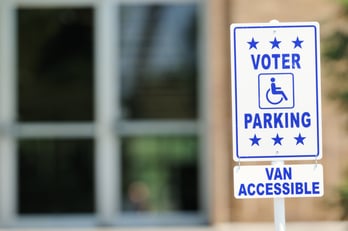Know your rights: Accessible voting for wheelchair use - Reeve Foundation
 by guest writer Stephanie Woodward
by guest writer Stephanie Woodward
Know Your Rights: Accessible Voting for Wheelchair Users
More than 35 million Americans with disabilities are eligible to vote in the United States. Wheelchair users not only have the right to vote, but we have the right to vote in accessible polling places and use accessible voting machines. In fact, wheelchair users have many rights when it comes to voting and our rights are protected by federal laws including the Americans with Disabilities Act and the Help America Vote Act. Before you go to cast your ballot this election season, take a few minutes to learn about your voting rights.
General Accessibility at Your Polling Place
At a minimum, your polling place should have a wheelchair accessible entrance, entrances and doorways that are at least 32 inches wide, wheelchair accessible voting booths, and handrails on all stairs. The U.S. Department of Justice has created an entire accessibility checklist for polling places and a guide with solutions to common access problems at polling places.
Many states allow people with disabilities to vote by mail, and some states allow for “curbside voting” where you park at your polling station and a poll worker will bring you the voting materials to your car. Please remember that even if you are offered voting by mail and curbside voting, you still have the right to vote in person at an accessible polling place if you choose.
Choosing How You Cast Your Ballot
The Help America Vote Act (HAVA) requires all polling places in Federal elections to have at least one accessible voting machine for voters with disabilities that allows the voter to vote privately and independently. While accessible voting machines can vary by state, this video from the New York City Board of Elections demonstrates the different features of accessible voting machines and can help you become familiar with their functions before Election Day. Accessible voting machines generally have features to assist people who are blind or have low vision such as audible instructions or color contrast options, and features to help individuals with dexterity disabilities, such as sip and puff options.
If you do not need an accessible voting machine, you can also choose to cast your vote using a standard ballot.
Choosing How You Vote, If You Want Help, and Who Helps you
As a voter with a disability, you have the right to vote in private, without help. This means you have the right to cast your ballot alone, just as many nondisabled voters do. You can do this by using a standard ballot or by using an accessible voting machine. If you prefer not to vote alone, you can have someone help you vote. You can either bring a person of your choice with you to your polling place to help you cast your ballot or you can ask a trained poll worker to help you use the accessible voting machine.
Where to Go If You Have Questions
If you have questions about your rights as a voter with a disability before Election Day, you can call the Department of Justice’s ADA Information Line at 1-800-514-0301 or you can contact the U.S. Election Assistance Commission at 866-747-1471 or clearinghouse@eac.gov.
If you believe that your rights have been violated when you voted, you can contact the Voting Section of the Department of Justice at 1-800-253-3931 or you can contact your local Disability Rights Protection and Advocacy Organization.
Stephanie Woodward is an attorney who is passionate about seeking justice for marginalized communities - and has an arrest record to show for it. As a proud disabled woman and civil rights activist, Stephanie is committed to making the law work for all oppressed people. She's also a proud cat mom and recently pushed her first marathon. Follow her on Twitter.
Join Our Movement
What started as an idea has become a national movement. With your support, we can influence policy and inspire lasting change.
Become an Advocate